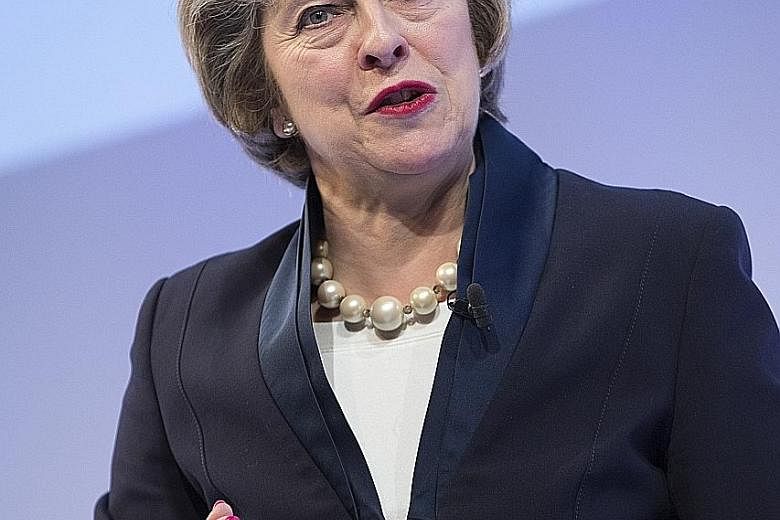LONDON • Prime Minister Theresa May has pledged to address business concerns that Britain could fall off a "cliff edge" into uncertain trading conditions after leaving the EU, hinting at some form of a transitional agreement.
It was the strongest sign yet that she could be open to a deal that would offer Britain time to forge a new trading relationship with the European Union when the up-to- two-year formal divorce talks are concluded, most likely in 2019.
Speaking to business leaders at the CBI, a leading business organisation in Britain, Mrs May moved to ease concerns among company bosses who had been alarmed by a plan to put workers on boards and to tackle excessive executive pay.
But she would not be moved to reveal more of her negotiating hand before she triggers Article 50 of the EU's Lisbon Treaty to launch two years of formal divorce talks, saying business leaders should understand better than anyone that she did not want anything to jeopardise winning the "right" deal.
Asked about business calls for a transitional deal, she said: "We want to get the arrangement that is going to work best for the UK and the arrangement that is going to work best for business in the UK."
Her spokesman later said: "There are a whole range of issues that are being worked through as we prepare for the negotiations, with a focus on looking at how we get the best deal for the UK."
EU officials say they have always assumed that Britain will need some transitional deal to bridge the gap between the withdrawal treaty and a new one setting out a long-term relationship, which they expect to take many years to negotiate.
Mrs May's words seemed to be a direct response to CBI president Paul Drechsler, who said business needed certainty over Britain's future relationship with the EU's single market and immigration rules for "European talent".
He said: "And there's another important question: What happens the day after Brexit? When the clock strikes midnight, and our two years' negotiating time is up.
"Today, businesses are inevitably considering this cliff-edge scenario - a sudden and overnight transformation in trading conditions.
"If this happens, firms could find themselves stranded in a regulatory no man's land."
Mrs May, who was appointed Prime Minister shortly after Britain voted in June to leave the EU, has been clear that she will deliver Brexit, but she has offered few details.
Some pro-Brexit campaigners have warned that she risks betraying the "will of the people" if she allows any delay to Brexit.
Businessman Richard Tice, co-chairman of campaign group Leave Means Leave, said: "Businesses want certainty as soon as possible, which is why Britain must leave the EU within a maximum period of two years after triggering Article 50 - no EU deal is better than a bad deal."
Keen to make sure her government stays on message, Mrs May has silenced her ministers, some of whom have given the strongest hints yet that she is not ruling out a form of transitional agreement with the EU.
"I am sure that everybody here in this room who's been involved in negotiations knows that you don't set out absolutely everything that you want to do right at the beginning of the negotiation," she said.
"So when I am able to make announcements about decisions... then I will do so."
She also said her government would invest an extra £2 billion (S$3.5 billion) a year in science research and development by 2020.
Mrs May has committed to the plans of the previous government to introduce a 17 per cent rate for corporate tax - the lowest level in the Group of 20 - and yesterday hinted that a mini-budget tomorrow may also include tax breaks for innovative businesses.
REUTERS, AGENCE FRANCE-PRESSE

